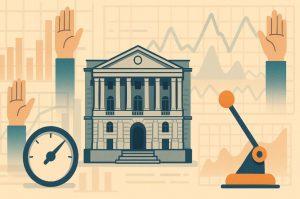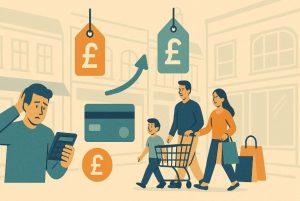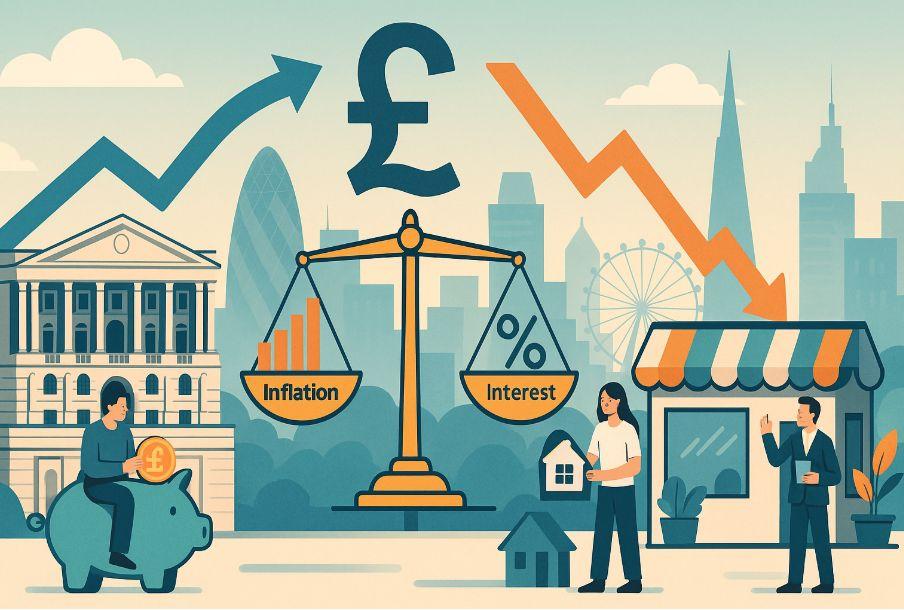In the UK, few economic levers have as wide-ranging an impact as the Bank of England (BOE) interest rates. These base rates, set periodically by the central bank, influence everything from inflation control and consumer behaviour to housing affordability and the strength of the pound.
This article explores how interest rate decisions taken by the BOE affect various areas of the UK economy, particularly in a city as financially central as London.
What Are BOE Interest Rates and How Are They Set?

BOE interest rates, commonly referred to as the base rate, are the benchmark rates that determine how much commercial banks pay to borrow money from the central bank.
These rates indirectly influence the interest consumers and businesses pay on loans, mortgages, and credit cards. The decision to set or change this rate lies with the Monetary Policy Committee (MPC), an independent body within the Bank of England that meets every six weeks.
The committee analyses key economic indicators such as inflation, GDP growth, and employment trends. Based on this data, they vote on whether to raise, lower, or maintain the base rate. The overarching aim is to maintain price stability while supporting sustainable economic growth.
Why Does the Bank of England Change Interest Rates?
The BOE primarily adjusts interest rates as a tool to manage inflation and economic growth. When inflation is above the government’s target usually 2% the MPC may increase interest rates to curb consumer spending and bring inflation down. Conversely, when economic activity slows or the country is heading into a recession, rates may be lowered to make borrowing cheaper and encourage spending.
Such interest rate changes are not made lightly. Each shift reflects a response to domestic economic signals and, in many cases, global economic developments that influence confidence, trade, and investment.
How Do BOE Interest Rates Influence Inflation in the UK?
Inflation and interest rates are deeply interconnected. Higher BOE interest rates tend to reduce inflation by discouraging borrowing and promoting saving. When money is more expensive to borrow, consumers and businesses alike tend to spend less, which slows down price rises across the economy.
In contrast, lower interest rates encourage greater spending and borrowing, increasing the flow of money in the economy. This typically leads to rising prices and higher inflation, especially if the increase in demand exceeds supply. The Bank of England monitors this relationship closely to avoid runaway inflation or deflation, both of which can be harmful.
What Is the Impact of BOE Interest Rates on Consumer Spending?

Consumer spending is directly influenced by the cost of borrowing and the returns on saving. When BOE interest rates increase, borrowing money becomes more expensive. Mortgage payments go up, personal loans cost more, and credit card interest rises, making it less attractive for households to take on debt. As a result, many consumers cut back on discretionary spending.
On the flip side, when interest rates fall, borrowing becomes cheaper and more people are willing to take loans for cars, home improvements, or holidays. Lower rates also reduce the appeal of saving, encouraging people to spend more instead. This shift in behaviour has a significant impact on retail, hospitality, and the broader service sectors.
How Do Interest Rate Changes Affect UK Businesses?
Businesses feel the effects of interest rate changes just as sharply. A rise in interest rates increases the cost of financing for companies that rely on loans for expansion or day-to-day operations. Start-ups and SMEs, which often operate on thin margins, may put off investment or hiring due to higher borrowing costs.
At the same time, higher rates can reduce customer demand for goods and services, forcing businesses to scale back operations or reduce prices. Lower interest rates, on the other hand, make borrowing more accessible, supporting business growth, job creation, and investment in new technologies or facilities.
What Happens to Savings and Investments When BOE Rates Change?
When the BOE raises interest rates, savers typically benefit. Banks and building societies increase the rates offered on savings accounts and fixed deposits, making it more attractive for individuals to save. For those relying on interest income such as retirees rate hikes can provide a welcome financial boost.
Investment patterns also shift with changes in interest rates. When rates are low, traditional savings accounts offer minimal returns, prompting many to explore higher-yield investments such as shares, property, or alternative assets. Conversely, higher interest rates may draw investors back toward fixed-income securities like bonds or high-interest savings products.
How Does the UK Housing Market React to BOE Interest Rate Changes?

The UK housing market is particularly sensitive to changes in interest rates. When the BOE increases rates, mortgage costs typically rise, making it more expensive for homebuyers to borrow. This often leads to a slowdown in property sales and, in some cases, downward pressure on house prices.
Lower interest rates, by contrast, stimulate the market. Cheaper mortgages mean buyers can afford more, leading to increased demand and rising property values. The effect is especially pronounced in areas like London, where property prices are high and any change in affordability can influence the market significantly.
What Role Do BOE Interest Rates Play During a Recession?
During periods of economic downturn or recession, the Bank of England often turns to interest rate cuts as a first line of defence. By reducing the cost of borrowing, the BOE encourages consumers to spend and businesses to invest, thereby injecting life into a faltering economy.
This strategy was used during the 2008 financial crisis and again during the COVID-19 pandemic, when the BOE cut rates to historic lows. These cuts helped prevent deeper economic contraction by keeping credit flowing and stabilising financial markets.
How Do BOE Interest Rates Affect the Value of the Pound?
Interest rate changes can influence the exchange rate of the pound sterling. A rise in interest rates usually strengthens the pound because it attracts foreign investors looking for better returns. A stronger pound can make imports cheaper and help reduce inflation, but it may also hurt exporters as UK goods become more expensive for overseas buyers.
Conversely, when interest rates are cut, the pound tends to weaken. While this can benefit exporters by making British products more competitively priced abroad, it may also increase the cost of imported goods, contributing to inflation.
Can We Predict Future BOE Interest Rate Decisions?

While it’s impossible to predict BOE decisions with complete accuracy, financial analysts and economists look at several indicators to form educated forecasts. These include inflation data, wage growth, employment statistics, and GDP figures. The Bank itself provides guidance in speeches and reports, though its decisions often depend on the latest economic developments.
Market speculation also plays a role. Interest rate futures, analyst commentary, and investor sentiment all reflect expectations, though the MPC may still act contrary to market consensus based on new data or global events.
BOE Interest Rate Effects on Economic Sectors
| Sector | Effect of High Interest Rates | Effect of Low Interest Rates |
| Consumers | Reduced borrowing, lower spending | Increased borrowing, higher consumer activity |
| Businesses | Expensive loans, delayed investments | Affordable credit, boosted expansion |
| Housing Market | Higher mortgage costs, weaker demand | Lower mortgage rates, stronger housing demand |
| Savings | Better returns on deposits | Poor returns, reduced incentive to save |
| Currency Value | Stronger pound, cheaper imports | Weaker pound, competitive exports |
| Investment | Shift to fixed-income securities | Move toward equities and higher-risk investments |
Conclusion
BOE interest rates function as a central gear in the vast machinery of the UK economy. They influence how consumers spend, how businesses operate, how much homes cost, and how attractive the country is to global investors. While rate changes may seem technical or distant, their impact is felt throughout daily life from mortgage payments in London to savings accounts in rural England.
Understanding how these decisions are made and how they ripple through the economy can help individuals and businesses make more informed financial choices. As the economic landscape evolves, the BOE’s interest rate policy will remain a crucial instrument in maintaining stability and promoting long-term growth.
FAQs
How does the BOE base rate affect loan interest?
When the base rate rises, banks typically increase loan interest rates, making borrowing more expensive across personal and business loans.
Are BOE interest rates important for renters?
Yes, higher rates may lead to increased landlord mortgage costs, which can be passed on as higher rents, particularly in urban centres like London.
Can rising BOE rates slow inflation?
Absolutely. Higher rates tend to curb consumer spending, which in turn eases demand-driven inflationary pressures.
How do investors react to interest rate hikes?
Investors often shift from stocks to bonds or fixed-income securities when rates rise, seeking more stable returns.
What is a base rate tracker mortgage?
It’s a type of mortgage that follows the BOE base rate so monthly payments rise and fall in line with BOE decisions.
Is the BOE influenced by politics when setting rates?
The MPC operates independently of the government to ensure unbiased, data-driven decisions free from political influence.
Should I fix my mortgage when rates are rising?
Fixing your mortgage during a rising rate environment can provide financial certainty, but it depends on your individual circumstances and risk tolerance.








